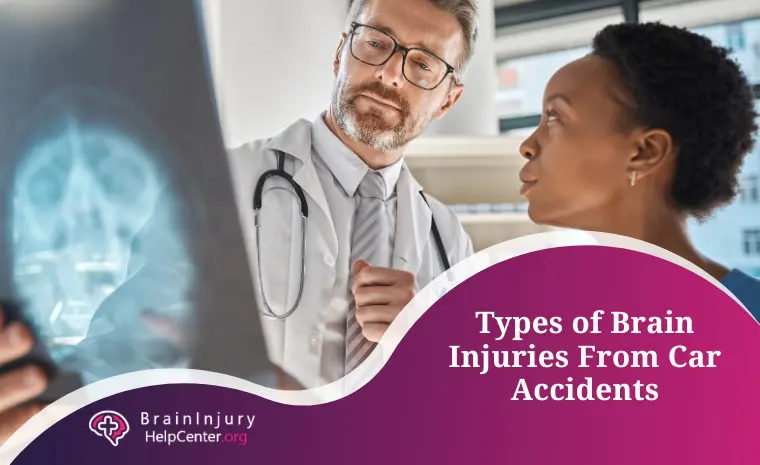Common Types of Brain Injuries From Car Accidents
Every year, countless lives are forever altered by car accidents, leaving victims with physical injuries and the invisible scars of traumatic brain injuries (TBIs). These injuries can devastate an individual’s life, affecting their cognitive abilities, emotions, and overall well-being.
In this article, we will explore the various types of brain injuries that can occur due to car accidents, shedding light on the causes, symptoms, potential long-term effects, and the importance of seeking immediate medical attention.
Suffering from a TBI after a car accident?
Brain Injuries Caused by Auto Accidents
Certain types of brain injuries can result from being in a vehicle accident. We explain the most common here:
Concussions
One of the most common types of brain injuries resulting from car accidents is a concussion. A concussion is a mild traumatic brain injury caused by a sudden blow or jolt to the head, leading to temporary impairment of brain function.
Symptoms may include headaches, dizziness, confusion, memory problems, and sensitivity to light and noise. While most individuals recover fully from concussions, some may experience persistent symptoms such as post-concussion syndrome, which can last for weeks or months.
Contusions
Car accidents can also cause contusions, which are bruises on the brain. These occur when a direct impact on the head causes blood vessels to rupture, leading to bleeding and localized damage.
Depending on the severity, contusions can result in a range of symptoms, from mild headache and dizziness to more serious conditions like loss of consciousness, seizures, and cognitive impairments. Prompt medical attention is crucial to assess and manage the extent of contusions and prevent further complications.
Diffuse Axonal Injuries
Diffuse axonal injuries (DAIs) are often the result of high-speed collisions. This type of injury occurs when the brain rapidly shifts or rotates within the skull, causing the nerve fibers (axons) to stretch or tear.
DAIs can have severe consequences, as they often damage deep brain structures and can lead to long-term cognitive and physical impairments. Symptoms may include unconsciousness, coma, profound confusion, and changes in behavior and personality.
Hematomas
Hematomas result from bleeding within or between the brain and the skull. Car accidents can cause two main types of hematomas: epidural and subdural. Epidural hematomas occur when blood accumulates between the skull and the outermost layer of the brain. In contrast, subdural hematomas involve bleeding between the brain and the middle layer of the protective tissues.
Both types can cause various symptoms, ranging from headache and drowsiness to seizures, slurred speech, and loss of consciousness. Timely diagnosis and surgical intervention are often necessary to prevent further brain damage.

Seeking Medical Attention and Legal Assistance
Recognizing the types of brain injuries from car accidents is crucial. If you or someone you know has been involved in an accident, it is vital to seek immediate medical attention, even if symptoms appear mild initially. Early diagnosis and treatment can significantly improve the chances of recovery and minimize long-term complications.
Moreover, it is crucial to consider the legal implications of brain injuries resulting from car accidents. Victims of such injuries may face mounting medical bills, rehabilitation costs, lost wages, and emotional distress. Consulting a personal injury attorney with extensive experience in traumatic brain injury cases can be invaluable in navigating the legal process and securing compensation for the physical, emotional, and financial damages suffered.
Got Into A Vehicle Accident? How Bad Is Your Injury? Checklist
While it is crucial to seek medical attention for a professional evaluation, here is a checklist to help you gauge the severity of your injuries after a vehicle accident:
- Check for visible injuries:
- Assess if you have any visible wounds, cuts, or bruises.
- Look for signs of bleeding, swelling, or deformities.
- Take note of any pain or tenderness in specific areas of your body.
- Evaluate your mental state:
- Assess your level of consciousness and alertness.
- Determine if you are experiencing confusion, disorientation, or memory loss.
- Pay attention to changes in your behavior, emotions, or personality.
- Monitor your head and neck:
- Be aware of any headaches, dizziness, or blurred vision.
- Check for neck pain, stiffness, or difficulty moving your head.
- Note any sensations of tingling, numbness, or weakness in your limbs.
- Assess your back and spine:
- Pay attention to back pain, especially in the lower back region.
- Determine if you have difficulty walking, standing, or sitting.
- Watch for any signs of spinal injury, such as tingling or loss of sensation in your extremities.
- Check your chest and abdomen:
- Note any difficulty breathing, chest pain, or tightness.
- Be aware of any abdominal pain, swelling, or tenderness.
- Look for signs of bruising or unusual sensations in the chest or abdominal area.
- Examine your extremities:
- Assess if you have any fractures, dislocations, or sprains.
- Check for swelling, redness, or deformities in your arms or legs.
- Determine if you have difficulty moving or bearing weight on your limbs.
- Look for signs of internal injuries:
- Watch for symptoms like abdominal pain, dizziness, or fainting.
- Take note of persistent nausea or vomiting.
- Pay attention to blood in your urine or stool.
This checklist is not a substitute for professional medical advice.
If you have been involved in a vehicle accident and suspect any injuries, it is essential to seek immediate medical attention. A healthcare professional will provide an accurate diagnosis, create an appropriate treatment plan, and ensure your injuries are adequately documented for insurance and legal purposes.
The Brain Injury Help Center is Here For You
Are you or someone you know suffering from a brain injury caused by an accident? Don’t face the challenges alone. The Brain Injury Help Center is here to support you every step of the way.
We offer personalized guidance tailored to your unique situation. Our experienced attorneys have a deep understanding of the complexities of brain injury cases, and we will fight tirelessly to ensure you receive the compensation you deserve for your medical expenses, lost wages, rehabilitation costs, and pain and suffering.
Don’t hesitate to seek the assistance you rightfully deserve. Reach out to the Brain Injury Help Center today for a free consultation.









